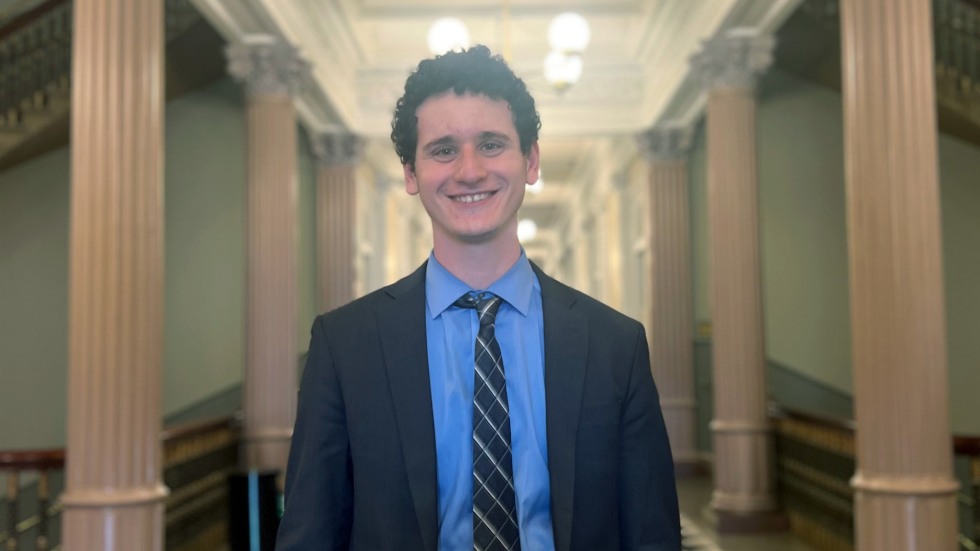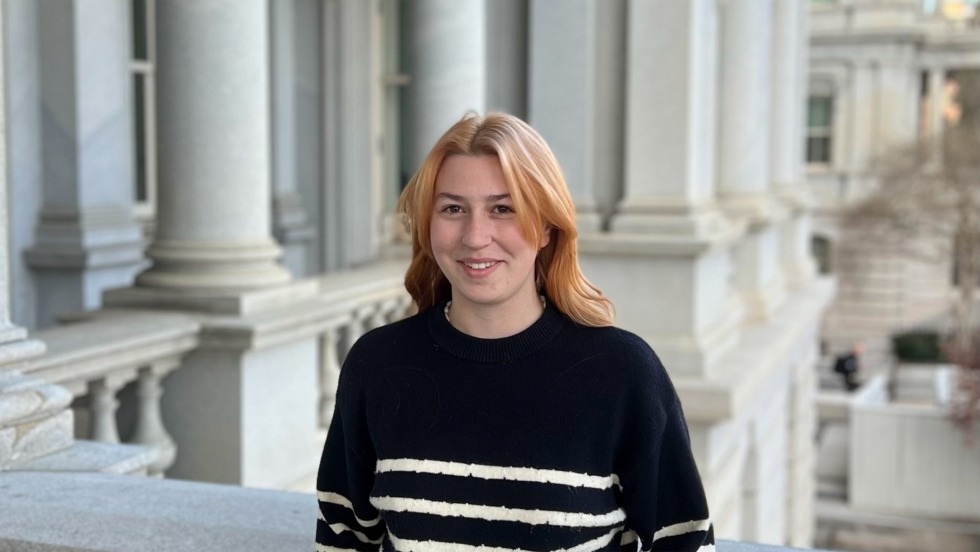Now in its seventh year, Brown in Washington offers undergraduates the opportunity to experience a dynamic internship while completing a full course load. During the fall 2023 semester, three International and Public Affairs (IAPA) concentrators — Allyson Cobery, Noah Rosenfeld and Sara Ryan — participated in the program while serving as White House interns. They expressed an appreciation for the opportunity to do hands-on learning in areas of interest at the White House while still being able to carry a full course load at Brown.
Internships that expand student horizons
Rosenfeld said he applied for a White House internship "on a whim." "When I received the internship in the Office of Presidential Correspondence, Brown couldn't have been more supportive in allowing me to participate in the Brown in Washington program so that I could do the internship, take classes, and graduate on time," he said.
Calling the Office of Presidential Correspondence, which processes every piece of correspondence sent to the White House and responds to constituents, "the eyes and ears of the presidency," Rosenfeld said, "Our job is to make sure that people are being heard and that all levels of government function well."
In daily interactions with American citizens, Rosenfeld said he learned how policies impact people on a personal level. "I'm interested in understanding how to better communicate with people across the political spectrum," said Rosenfeld, who serves as co-president of the Brown College Democrats.
As part of her internship in the Office of Federal Financial Management in the Executive Office of the President, Ryan frequently helped to organize meetings where senior government officials drafted President Biden's 2025 budget. She also accompanied White House staff to federal agency meetings and congressional hearings, conducted research, and assisted in the writing of informational memos. "I helped begin the process for creating administrative policy changes designed to streamline federal financial assistance applications to reduce the burdens on both the applicants and the federal agencies," said Ryan.
During her stint with the White House Internship Program in the Office of the Vice President, Cobery assisted on diverse policy issues ranging from housing, labor unions, and artificial intelligence to education, gun violence, and the maternal health crisis.
"It's been so meaningful to work in this office and engage with so many issues," she said. Cobery also volunteered at the state visit of Australian Prime Minister Anthony Albanese. "I wouldn't have been able to have these experiences anywhere else," she said.
Through her internship, Cobery said she gained a deeper understanding of specific policy issues that she believes will enhance her contributions to and appreciation of future political science courses.
Brown in Washington students said they took advantage of their time in the nation’s capital in other ways. Rosenfeld said he made Washington, D.C. his campus. In his independent research project, he explored diverse museums and their collections, including — most notably — the United States Holocaust Memorial Museum and the Smithsonian's National Portrait Gallery. "I've written some journal entries addressing the creation of art as a medium of politics," he said.
"There's a deliberateness to every exhibit decision, such as juxtaposing the portraits of the late Civil Rights advocate and congressman John Lewis and former President Donald. J. Trump, that I hadn't expected." He also adopted an ethnographer's approach and observed how visitors interact with exhibits. "Museum exhibits tell the story of ourselves and how we present American mythology," added Rosenfeld, who will complete a research paper on the topic for his independent study.
Practitioners bring new perspectives
During the semester, students in the program enjoyed many opportunities to learn from seasoned professionals from government and non-profit agencies.
Students visited the Administrator of the U.S. Agency for International Development (USAID) and former ambassador to the United Nations, Samantha Power as part of the IAPA course, Diplomacy: An Art That is Not Lost. The class was taught by Brian Atwood, who himself served as a USAID administrator during the Clinton administration.
"I was interested to learn how Samantha Power prioritizes programs and aligns her goals with the Biden administration's goals," said Ryan. "She shared how funding can help people across the globe and explained the importance of the United States' goal to lead the initiatives in providing aid to developing and war-torn countries," she said.
Ryan added praise for the course's instructor: "We should all be in awe of Brian. He has wonderful lectures and stories describing how he implemented different diplomatic strategies throughout his career."
Cobery said she also appreciated the opportunity to learn from experienced policy practitioners. "We had other great panels with former ambassadors Norm Eisen — who has a close relationship with former President Barack Obama — and [former U.S. Ambassador to Switzerland and Liechtenstein and 1993 Brown alumna] Suzi LeVine," she said.
Rosenfeld said Adjunct Lecturer in International and Public Affairs Madeline Campbell's course, the Brown in Washington Practicum, informed his understanding of workplace culture and power imbalances and how policies are formulated. "Madeline Campbell is an outstanding professor. I'm grateful to have a professor who's doing policy work and bringing that perspective, expertise, passion and intellect," he said.
Calling Campbell's classes "incredible," Cobery recalled, "She taught our first class on Zoom from Western Sahara where she was conducting diplomatic talks."


